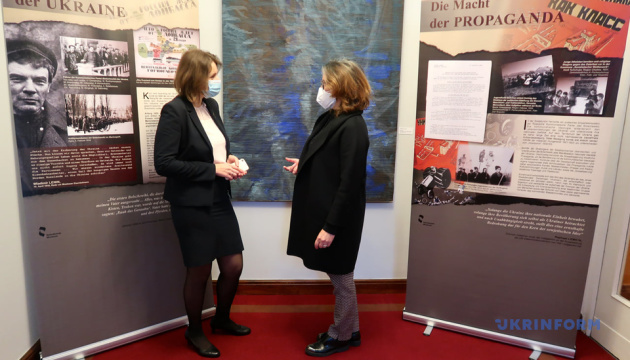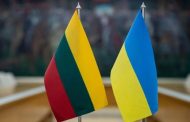Kyiv.Ukraine.Ukraine Gate – November 14,2021- A discussion on the reflection of the complex topics of history in literature took place on Saturday at the Embassy of Ukraine in Germany as part of the Great Famine Remembrance Month.
The ceremony was attended by world-famous Ukrainian writer, Ukrainian PEN chief Andrei Kurkov, literary translator, Drahumanov Prize-winning Claudia Dett, journalists, members of the public and diplomats.
Special attention will be paid to the Holodomor in Ukraine in 1932-33. The participants agreed that in some places more attention is paid to this topic abroad than in Ukraine itself, that new art forms are needed to interest young people, as the number of living witnesses who could tell about the terrible events is decreasing.
“Young people are more interested in today’s problems than in historical ones,” Kurkov said. He believes that modern forms “without ideological pressure, without ideological influence, which young people reject” are suitable for this age category.
Date agrees that the current generation has this “historical gap,” and if it is not filled, the memory may disappear. She considers important the educational role of literature, but above all audiovisual forms that could reach the hearts of specific examples, stories of individuals. “Young people often do not trust the older generation very much, but they believe the information obtained from popular sources,” adds the translator and author.
The famous German journalist Richard Herzinger said that the Holodomor case was highly politicized and highly “explosive”. The fact that the petition to the German Parliament regarding the Great Famine considered the genocide of the Ukrainian people, which has been considered for a long time, is due both to the unwillingness to “irritate Putin” and fears of other political consequences.
“In Germany, many people have no sympathy for the current regime in Russia, which is why they are urging people to be especially careful not to provoke,” the journalist said. He also recalls how Berlin’s relations with Ankara deteriorated after the Bundestag recognized the Ottoman assassination of Armenians during the Ottoman Empire. German politicians do not want a repeat of the situation. In addition, there are fears that other nations will demand recognition of the injustices that have taken place in their history.
However, the interlocutor of the agency is convinced that the efforts made by the Ukrainian side, in particular, the Embassy, should be continued, because “those who do not shout will not be heard,” this provokes discussion. He also suggests that German politicians could find a compromise solution, “build a bridge” – to adopt, for example, a resolution that does not use the word “genocide”, but, for example, “a special crime of totalitarianism of the 20th century”, which will be condemned and thus expressed solidarity with Ukraine.
Herzinger is one of the few German journalists to cover the Holodomor in the media. He has visited Ukraine several times, in particular, in September this year he once again visited the memorial to the victims of the Holodomor in Kyiv.







